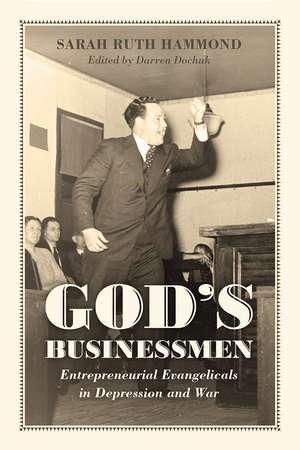God's Businessmen: Entrepreneurial Evangelicals in Depression and War
Autor Sarah Ruth Hammond Editat de Darren Dochuken Limba Engleză Hardback – 11 ian 2018
The evangelical embrace of conservatism is a familiar feature of the contemporary political landscape. What’s less well-known, however, is that the connection predates the Reagan revolution, going all the way back to the Depression and World War II. Evangelical businessmen at the time were quite active in opposing the New Deal—on both theological and economic grounds—and in doing so claimed a place alongside other conservatives in the public sphere. Like previous generations of devout laymen, they self-consciously merged their religious and business lives, financing and organizing evangelical causes with the kind of visionary pragmatism that they practiced in the boardroom.
In God’s Businessmen, Sarah Ruth Hammond explores not only these men’s personal trajectories but also those of the service clubs and other institutions that, like them, believed that businessmen were God’s instrument for the Christianization of the world. Hammond presents a capacious portrait of the relationship between the evangelical business community and the New Deal—and in doing so makes important contributions to American religious history, business history, and the history of the American state.
In God’s Businessmen, Sarah Ruth Hammond explores not only these men’s personal trajectories but also those of the service clubs and other institutions that, like them, believed that businessmen were God’s instrument for the Christianization of the world. Hammond presents a capacious portrait of the relationship between the evangelical business community and the New Deal—and in doing so makes important contributions to American religious history, business history, and the history of the American state.
Preț: 256.66 lei
Preț vechi: 325.94 lei
-21% Nou
Puncte Express: 385
Preț estimativ în valută:
49.12€ • 50.99$ • 40.96£
49.12€ • 50.99$ • 40.96£
Carte indisponibilă temporar
Doresc să fiu notificat când acest titlu va fi disponibil:
Se trimite...
Preluare comenzi: 021 569.72.76
Specificații
ISBN-13: 9780226509778
ISBN-10: 022650977X
Pagini: 240
Dimensiuni: 152 x 229 x 25 mm
Greutate: 0.48 kg
Ediția:1
Editura: University of Chicago Press
Colecția University of Chicago Press
ISBN-10: 022650977X
Pagini: 240
Dimensiuni: 152 x 229 x 25 mm
Greutate: 0.48 kg
Ediția:1
Editura: University of Chicago Press
Colecția University of Chicago Press
Notă biografică
Sarah Ruth Hammond (1977–2011) received her PhD from Yale University in 2010 and subsequently held a position as visiting assistant professor at the College of William & Mary. Her research focused on American religious history. Darren Dochuk is associate professor of history at the University of Notre Dame. He is the author of From Bible Belt to Sunbelt: Plain-Folk Religion, Grassroots Politics, and the Rise of Evangelical Conservatism.
Cuprins
Editorial Note
Acknowledgments
List of Abbreviations
Introduction
Depression
1. R. G. LeTourneau’s Prosperity Gospel
2. Herbert J. Taylor, Rotarian Fundamentalist
3. Corporate Christianity’s Civil Activism
War
4. The Wartime Vision of Laymen’s Evangelism
5. The Wartime Consolidation of Laymen’s Evangelism
Conclusion
Notes
Index
Acknowledgments
List of Abbreviations
Introduction
Depression
1. R. G. LeTourneau’s Prosperity Gospel
2. Herbert J. Taylor, Rotarian Fundamentalist
3. Corporate Christianity’s Civil Activism
War
4. The Wartime Vision of Laymen’s Evangelism
5. The Wartime Consolidation of Laymen’s Evangelism
Conclusion
Notes
Index
Recenzii
“Hammond ably demonstrates that “between their shoe leather and their pocketbooks, they and other businessmen made revivalism happen,” as the New Deal turned regulation, taxes, and unions into religious issues in their eyes. Highly recommended.”
“Hammond's argument for the lasting influence of “God's businessmen” becomes more and more convincing as the reader recognizes one evangelical initiative after another as a given of contemporary American life.”
“A fascinating study of faith, finances, and the nature of American political life that will be of interest to historians of Christianity and scholars whose work mines the symbiotic relationship between economic practice and religious activism.”
“Hammond argues that the tendency of historians to concentrate on the role of theologians and clergy within American evangelicalism has obscured the importance of lay businessmen in shaping evangelicalism’s engagement with American culture, economy, and politics. The evidence Hammond marshals here, combined with the other recent work mentioned above, makes her claim all but indisputable.”
“Well-researched and well-argued, God’s Businessmen builds well on the recent literature on the intersection of religion, business, and politics and advances the field in important new directions. Equally well-written, it will appeal not just to interested academics but to educated general audiences as well. It is, in short, a triumph.”
“God’s Businessmen adjusts our view of twentieth-century evangelicalism, helping move the story toward lay leaders and away from just the preachers and evangelists. Moreover, the book complements other recent scholarship in showing how naturally and easily conservative and mainline Protestantism became wedded to conservative economics and politics.”
